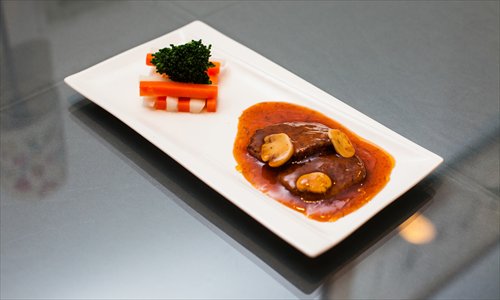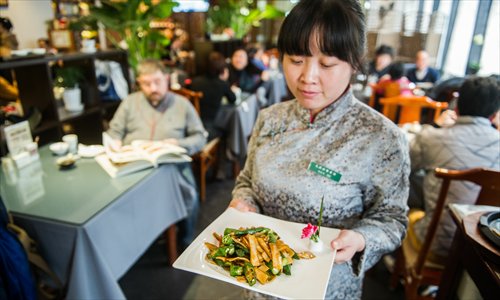HOME >> METRO BEIJING
The V word
By Zhang Xinyuan Source:Global Times Published: 2014-11-27 19:38:01
Why is it so hard to be vegetarian in China?

People who order vegetarian dishes in China are frequently met with unwanted surprises. Photo: Li Hao/GT
Candice Snyder has sent back more dishes than she can count since arriving in Beijing a year ago. Almost every time she orders a "vegetarian" dish, it comes back with meat in it.
Recently, she ordered a dish of fried green beans at a small restaurant near her apartment in Dongcheng district.
"I told the waitress, wo bu chi rou ('I don't eat meat'), and she assured me that the dish doesn't have meat in it," said Snyder, a 30-year-old English teacher. However, as soon as the dish was brought to her, she noticed that something was awry. The sauce had mince in it. Snyder pointed out the error to the waitress.
"The waitress insisted that it was vegetarian, because it only has meat juice and little pieces of meat, not big chunks," said Snyder.
More often than not, such misunderstandings end up with Snyder berating the perplexed waiters in exasperation, then leaving the table without having been fed.
"I don't care if it's big chunks of meat or small ones or meat juice. The smell of meat just makes me gag," said Snyder.
"Most regular Chinese restaurants have a lower standard for what 'vegetarianism' is, compared with countries like the US and India," said Gao Ji, manager of Tianchumiaoxiang Vegetarian Restaurant, which has branches in Haidian and Chaoyang districts. "Most of them just don't know what 'vegetarian' means."


Although there remains a resistance to vegetarianism in China, the number of vegetarian restaurants in the country have grown steadily in the past decade. Photos: Li Hao/GT
What is and isn't meat?
Snyder has been a vegetarian ever since she was three years old.
"The smell of meat is just disgusting to me, so I strictly steer clear of any meat, whether it's beef, pork or seafood," she said.
In her life in the US and her travels through Europe, she never encountered difficulties with being a vegetarian.
"Most restaurants in the US and in European countries will print ingredients of every dish in the menu, so I can have a clear idea of what I am eating," said Snyder. "Some restaurants even have a section on the menu for vegetarians."
In China, Snyder has become accustomed to being met with bewildered glares whenever she tells waitstaff that she is vegetarian. "They're like, is this laowai ('foreigner') crazy?"
An article that appeared in the Huffington Post in August last year suggested that one of the possible reasons that foreigners have a hard time eating vegetarian food in China is due to the language barrier, but Snyder dismissed this hypothesis.
"I learned how to say 'I don't eat meat' and 'I only eat vegetarian food' in Chinese, but the idea that small pieces of meat [don't count] as meat ambushed me," Snyder said, giving the example of another occasion on which she ordered a vegetarian salad, only to find cubes of ham in it. When she raised a complaint with the waitress, Snyder was told that ham was not meat.
Mao Paopao, a 32-year-old vegetarian and native Chinese speaker, agreed with Snyder's assertion that language was not the main problem with trying to live a vegetarian lifestyle in China.
Mao lived in the Netherlands for eight years, before coming back to China in 2011. She had never liked eating meat as a child, and her experiences in the Netherlands, where she said 10 percent of the population are vegetarian, persuaded her to commit to not eating meat even after she returned to China.
When she relocated to China, Mao was confident that her vegetarianism would not present any problems. After all, Shanghai, the city she would be living in, was a cosmopolitan metropolis not unlike New York and Amsterdam - places where vegetarianism is a common alternative lifestyle choice.
She experienced a rude awakening.
"I ordered mapo tofu and stewed cabbage, and I told the waiter that I don't eat meat in perfect Chinese," Mao said. "[But] life in the Netherlands led me to forget that in Chinese dishes that use vegetables as the main ingredient, meat is usually used to season and give flavor to the dish."
As a result, the mapo tofu that Mao ordered had little pieces of meat in it, and the stewed cabbage was braised in a chicken broth.
"I blamed myself for forgetting Chinese cooking customs, but the waiters should have known when I told them I was a vegetarian that it means I don't eat anything that's made of animal products," Mao said.
Other common traps for vegetarians in China include the broth that is used in hotpot and malatang (vegetables and meat boiled in hot spicy soup), which are often rendered from animal meat or bones, said Laura Stessan, a 23-year-old student at Tsinghua University, who has been a vegetarian for 10 years.
Growing awareness
Tang Li, the chairman of the Chinese Society of Vegetarians, said that the reason for shoddy service for vegetarians in China was because there were fewer vegetarians compared to other countries. The concept of vegetarianism, he said, had not yet entered the mainstream consciousness.
"In China, vegetarianism is generally a privileged choice for a small group of people, who choose this lifestyle due to health considerations, environmental concerns or religious beliefs," Tang said.
According to a survey published by the International Vegetarian Union in 2011, only 1 percent of Chinese consider themselves to be vegetarian. In comparison, 6 percent of Britons, 40 percent of Indians, and 3 percent of people in the US identify as being vegetarian, according to a report published by raw-food-health.net in 2006.
"In Western countries, most people choose to become vegetarian because they are against animal cruelty, and because the breeding and keeping of livestock uses a significant amount resources, to the detriment of the environment," Tang said.
In China however, the right to eat meat was considered to be sacred, said Tang. According to him, many Chinese people still remember living through periods when food was extremely scarce, like the Great Leap Forward (1958-61). "The memory of famine has led Chinese people today to consider meat a necessity of life. This also explains why small pieces of meat are often added to vegetable dishes or soups in Chinese cooking," said Tang.
However, awareness about vegetarianism is gradually improving in China, said Gao. There are a number of NGOs dedicated to promoting vegetarianism as an ethical lifestyle choice, such as the Chinese Society of Vegetarians, the Chinese Vegetarian Union and Biechipengyou ("Don't eat friends"), and according to Gao, the number of vegetarian restaurants in Beijing has increased from around 5 to more than 100 over the last decade.
According to Stessan, non-vegetarian restaurants are also getting better at catering to the needs of vegetarians.
"Most regular restaurants around Tsinghua University can cook a perfect vegetarian dish as long as you tell them you don't eat meat," said Stessan. As restaurants have gained more experience serving vegetarians, they have gotten better at accommodating customers' needs, Stessan added.
How to be vegetarian in China
After Mao's botched dining experiences, she has chosen to cook for herself as much as possible. She frequently goes to organic food markets for her vegetables, and hosts dinner parties for her friends at home rather than going out to eat.
When she does decide to eat out, Mao generally chooses vegetarian restaurants. She noted however, that this wasn't a tenable option for those who wanted to eat out regularly, due to cost and the limited number of vegetarian restaurants.
"From my experience, it can cost between 100 yuan ($16.29) and 200 yuan per person for a proper meal [at a vegetarian restaurant]. That's pretty high for a Chinese person on an average income," she said.
For vegetarians who want to be able to eat regularly at non-vegetarian restaurants, Snyder suggested keeping a list of spots around the city where the waitstaff are patient and attentive enough to meet the needs of vegetarians, and are familiar with the ingredients in their dishes.
"You can also try to learn more Chinese words, and ask about the details of a dish relentlessly," said Snyder. "Does it have meat juice in it? Does it have chicken cubes in it?"
Another alternative, said Snyder, was to only order dishes that one is certain contain no meat. "I just stick to some dishes I know for sure are vegetarian, such as disanxian [sauteed potatoes with green pepper and eggplant] and scrambled eggs with tomato. The options are very limited, but it's sufficient to feed me," said Snyder.
"As for details such as [meat residue] in the broth or on the utensils, my suggestion is don't get too picky."
Posted in: